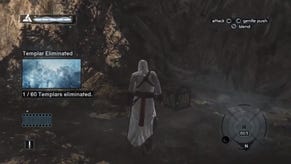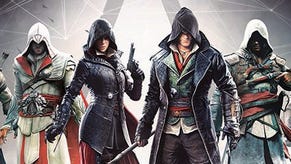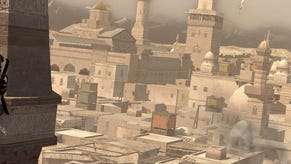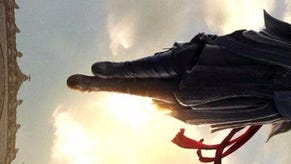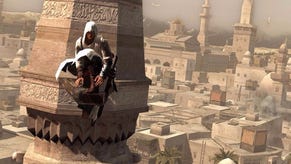Assassin's Creed
Getting away with murder.
Which is to say that the actual assassinations are a bit ropey. You might imagine that you stalk carefully through heavily guarded hallways, keeping to the shadows, climbing across ceilings, and eventually steal into your target's presence and hold a dagger to their throat like a sort of medieval Leon. But the truth is, again, closer to Crackdown. You do indeed stalk a bit, but only by virtue of the guards being too thick to spot you at more than about 40 feet. There's no clever hiding or skulking. There are no interesting approach tactics. You just get close, watch a cut-scene, and then strike. You seldom do this without alerting the target and his guards - instead you either give chase before planting a dagger in his throat, or you get into the usual sort of block-and-counter fight and go at it until you've stabbed him enough to get the final cut-scene.
Then you run away until nobody can see you and you can duck into a bale of hay or a rooftop shack until the alert indicator's run down.
If this all sounds familiar and slightly disappointing, then I've picked the right words. It is. It would be lovely to wax flowery like Jim did about Crysis. But there simply isn't any variety to wax about. Enemies spot you and then surround you and you either kill them or leg it and hide. That's it. There's almost no fun to be had just playing with the world. The castle at Masyaf looks like Lara Croft's mansion, but dreams of climbing around exploring it are just that, as you struggle and fail to gain any purchase or hop between ledges and lips that ought to support you.
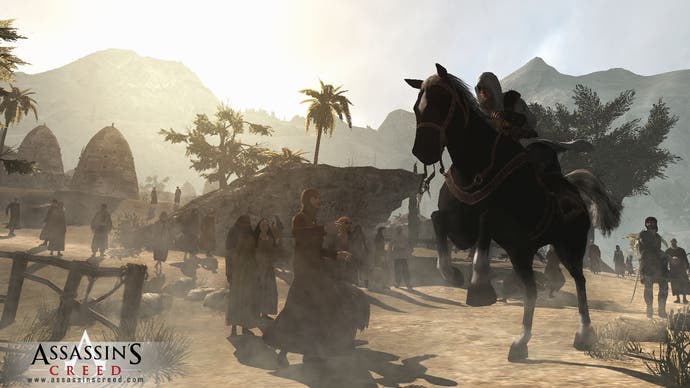
By contrast, Crackdown is a much better and more imaginative free-roaming action game, and its very existence dulls the impact of a lot of Assassin's Creed's inventions. Creed's collectibles - flags hidden around each city - are less visible but also less exciting than Agility Orbs. Having to reach the peak of viewpoint towers is less satisfying than getting to Agency Supply Points because, despite articulating one of the best and most interesting platform game schemes in memory, Ubisoft doesn't really challenge you with it. In fact, there are only one or two viewpoints you'll have trouble reaching in the whole game.
It might seem a bit unfair to make such a song and dance of a comparison with a game that - on one platform at least - Creed isn't even up against, but by the end the glove fits so completely that it's impossible to ignore your fingers poking out of the holes, feeling around for missing comforts. For two such similar games to succeed in the same year, the second one has to be up to the quality of the first, or distinguish itself enough to evade comparison. Assassin's Creed sadly doesn't.
It even trips and stumbles on all the old quirks and flaws we're tired of: NPCs who say the same thing over and over again (worse: different voice actors saying the same thing for each city - get used to "You dirty thief, I'll have your hand for that"), guards who get stuck glitching up against walls, failing missions for arbitrary reasons, a third-person camera with which you're often forced to wrestle. After about hour four, the most amusing thing is checking the Achievements screen to discover there's one for beating up female beggars. Er?
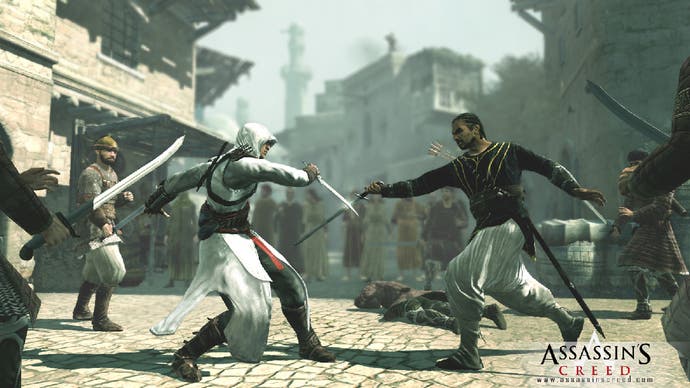
Even more damning is that the game's big reveal falls almost completely flat. You see it coming a mile off, and then it stands there going "Ta-da!" And - perhaps with a view to filling out the inevitable sequels - there's little in the way of resolution anyway. One storyline concludes, in similarly predictable fashion, and the other just winks at you and then buggers off. I don't think I've ever stared at a credits screen in as much disbelief and disappointment. Not helped all that much by the preceding hour of gameplay, which consists entirely of fighting. Fighting fighting fighting. Had enough of fighting? Good, because there's some fighting to do.
It's a fitting end to a game that starts off brightly, wriggling elusively as you try and grasp what's going on, delighting in the mechanics and beautiful visuals, before sinking into a pattern that, while fairly gratifying, never evolves and ultimately becomes a bit boring, and quite amazingly repetitive. After each briefing, you travel the same route to the Masyaf border with no way to skip the journey, and it takes five minutes. You will play to the end anyway, I imagine, because it's not very frustrating, it looks nice and the low-level mechanics are engagingly fluid and spectacular to watch. And you certainly want to know what's going on. Or will do, until it stops dazzling to deceive and goes a bit Dan Brown. But while there's no end of potential to the foundations Ubisoft Montreal has set, the game built upon them is ultimately disappointing, and leaves you unfulfilled.

